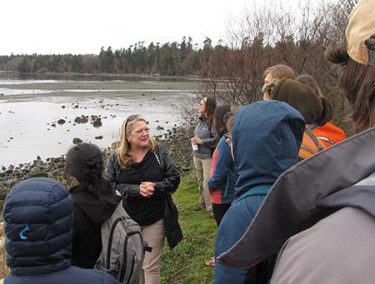 For some people, shorelines are places to sit and admire a sunset. For others, they are fascinating ecological or geological zones. For Cleo Woelfle-Erskine and July Hazard, shorelines are all of this and more.
For some people, shorelines are places to sit and admire a sunset. For others, they are fascinating ecological or geological zones. For Cleo Woelfle-Erskine and July Hazard, shorelines are all of this and more.
During the spring, Woelfle-Erskine and Hazard oversee a course that teaches undergraduate and graduate students in field writing, involving visits to tribal communities and explorations of shoreline histories and ecologies. The course begins over spring break out on the San Juan Islands using the College of the Environment’s Friday Harbor Laboratories as home base. During this time, the instructors help students gain an understanding of historical and ecological dynamics of the landscape through careful observation before returning to Seattle for the remainder for the school year.
“We wanted to train them in the practices of seeing and observing, to read the landscape in a way that students might be more familiar with reading a text,” says Woelfle-Erskine.
But the class — Ecopoetics Along Shorelines (CHID 480A / Honors 391A / SMEA 550C) — is about so much more than understanding ecology. It is meant to bring a diverse set of students together to share and learn from one another, recognizing that often the humanities and sciences look at and approach issues through different lenses. By linking the humanities and the sciences, new perspectives are gained that strengthen each other’s work.

